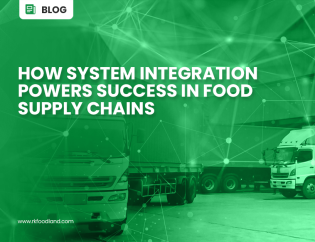
[Avg. Read Time < 5 mins]
In today’s dynamic marketplace, achieving supply chain excellence is a priority for businesses across industries. However, food businesses face unique challenges such as changing consumer demands, fierce competition, stringent regulations, and narrow profit margins. To overcome these obstacles and gain a competitive advantage, businesses are increasingly forming partnerships within the ecosystem. Unfortunately, many of these partnerships fail to deliver the intended results and can also cause a business up to 9% of its overall sales. Factors contributing to these failures include divergent goals, communication breakdowns, financial difficulties, technological limitations, cultural disparities, and legal or contractual complications. This blog, guides CXOs through the complexities of such partnerships, advocating for a blend of mutual understanding, shared goals, and respect for the contract’s spirit and legality. As a food industry leader, harnessing these insights can help you cultivate successful supply chain partnerships and drive your organization’s growth.
Importance of Business Spirit in Contracting
In the realm of supply chain partnerships, the importance of the business spirit in contracting cannot be overstated. While legal agreements provide a framework, they alone are insufficient for fostering effective and successful collaborations. Understanding and embracing the legacy and spirit of the partnership are fundamental.
Let’s understand this with an example:
Once upon a time, a popular QSR chain known for its delicious burgers, partnered with a dedicated Food Supply Chain Service provider. Recognizing that legal agreements alone couldn’t guarantee success, they focused on building trust, understanding each other’s values, and respecting their expertise.
The QSR business visited Supply Chain Service provider’s facility, witnessing their commitment to sustainability, quality, and supporting local farmers. With aligned objectives and interests, they collaborated closely, exchanging feedback and market insights. The Supply Chain Service provider ensured a steady supply of high-quality ingredients that met the QSR brand’s stringent standards. While legal compliance was important, they found a balance between regulations and their shared vision, embracing the business spirit.
The partnership flourished as QSR brand’s customers appreciated the superior quality and freshness of their burgers. They became an example in the QSR industry, showcasing how a partnership rooted in trust, shared values, and effective communication with a Food Supply Chain Service provider could drive success and provide sustainable growth.
Ensuring alignment of objectives, interests, and values establishes a shared vision and purpose. Striking a balance between legal compliance and the partnership’s vision is key to achieving a successful supply chain partnership. By embracing the business spirit in contracting, businesses can enhance their chances of cultivating thriving and sustainable supply chain partnerships.
Elements of a Successful Supply Chain Contract
In a noteworthy finding by World Commerce & Contracting, it is revealed that an overwhelming 84% of its members recognize the necessity of simplifying their contracts. To achieve success, a supply chain contract must encompass various essential elements that significantly contribute to its overall effectiveness.
- Firstly, defining the scope of work and deliverables establishes a clear understanding of the project’s objectives and expectations.
- Clearly outlining the roles and responsibilities of each party ensures accountability and avoids ambiguity.
- Determining pricing structures and payment terms enables a fair and transparent financial arrangement that benefits both parties.
- Inclusion of performance metrics and key performance indicators (KPIs) allows for objective evaluation and measurement of progress and success.
- To address potential conflicts, the contract should incorporate well-defined dispute resolution mechanisms and termination clauses that provide a framework for resolving issues swiftly and fairly.
- Additionally, addressing intellectual property rights and confidentiality concerns safeguards valuable information and fosters trust between partners.
Ultimately, a successful supply chain contract provides a governance structure that balances flexibility and discipline, mitigates conflicts, and aligns the risks and rewards shared by both parties. By integrating these elements into their contracts, businesses can lay the groundwork for a strong and prosperous supply chain partnership.
Best Practices for Contract Management
A substantial majority of contracts experience a decline in value by approximately 10-15%. However, by exercising control over this aspect, businesses can diminish operational costs and enhance the efficacy of risk mitigation measures. To cultivate prosperous partnerships within the food industry and food supply chain management, the implementation of effective practices for contract management and compliance is of paramount importance.
- Clear communication and reporting protocols should be established to ensure that all parties involved, including suppliers, manufacturers, distributors, and retailers, have a shared understanding of expectations and responsibilities specific to the food sector.
- Monitoring and tracking contract performance and deliverables play a vital role in ensuring the quality, safety, and timely delivery of food products throughout the supply chain.
- Addressing issues and disputes proactively is particularly important in the food industry, where factors such as perishability and regulatory compliance require swift resolution to prevent disruptions and ensure consumer satisfaction.
- Compliance with food safety regulations, quality standards, and labelling requirements is paramount to protect public health, maintain trust, and meet legal obligations.
- Continual evaluation and improvement of the contract enable food industry stakeholders to adapt to changing market dynamics, emerging technologies, and evolving consumer preferences.
By implementing these best practices, businesses can build strong and sustainable partnerships in the food industry, characterized by transparency, quality assurance, effective communication, and the ability to navigate the unique challenges of the food supply chain.
To sum up, contracting the right way is essential for achieving success in supply chain partnerships. Legal agreements alone are not enough. Partners must go beyond the legal framework and focus on understanding the interrelationships, agreeing on a shared vision, goals, and performance drivers, and respecting both the spirit and legality of the partnership. By embracing these principles, businesses can establish strong and resilient supply chain partnerships that drive growth and innovation in the food industry. If you’re a Food CXO looking to enhance your understanding of successful supply chain partnerships and learn from the experiences of leading food brands in India, we invite you to connect with our experts. Their wealth of expertise and extensive work with renowned food brands can provide invaluable insights and guidance on optimizing your supply chain.
Take this opportunity to gain a competitive edge and propel your food business to new heights. Connect with RK Foodland experts today and unlock the TRUE potential of your supply chain.
Related Content | Foodland’s Resources
How to Improve Contract Visibility Across Your Organization
The “TRUE” essence of a supply chain partnership
The Importance of Contract Management & Negotiation in Supply Chain Management









